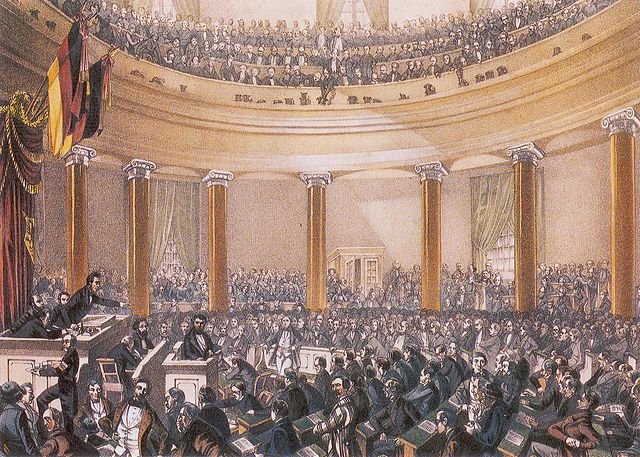German nationalism is an ideological notion that promotes the unity of Germans and of the Germanosphere into one unified nation-state. German nationalism also emphasizes and takes pride in the patriotism and national identity of Germans as one nation and one people. The earliest origins of German nationalism began with the birth of romantic nationalism during the Napoleonic Wars when Pan-Germanism started to rise. Advocacy of a German nation-state began to become an important political force in response to the invasion of German territories by France under Napoleon Bonaparte.
Johann Gottfried Herder, the founder of the concept of nationalism itself, although he did not support its program
Philosopher Johann Gottlieb Fichte is considered along with Romantic poet-soldier Ernst Moritz Arndt as the founder of German nationalism.
Depiction of the session of the Frankfurt Parliament in 1848
Germania, painting by Philipp Veit, 1848
Germans are the natives or inhabitants of Germany, or sometimes more broadly any people who are of German descent or native speakers of the German language. The constitution of Germany, implemented in 1949 following the end of World War II, defines a German as a German citizen. During the 19th and much of the 20th century, discussions on German identity were dominated by concepts of a common language, culture, descent, and history. Today, the German language is widely seen as the primary, though not exclusive, criterion of German identity. Estimates on the total number of Germans in the world range from 100 to 150 million, most of whom live in Germany.
The Holy Roman Empire in 972 (red line) and 1035 (red dots) with the Kingdom of Germany, including Lotharingia, marked in blue
Victims of the Holocaust in a mass grave at Bergen-Belsen concentration camp
Germans expelled from Poland in 1948
A Memorial to the Murdered Jews of Europe in Berlin; remembering the Holocaust is an essential part of modern German culture.








